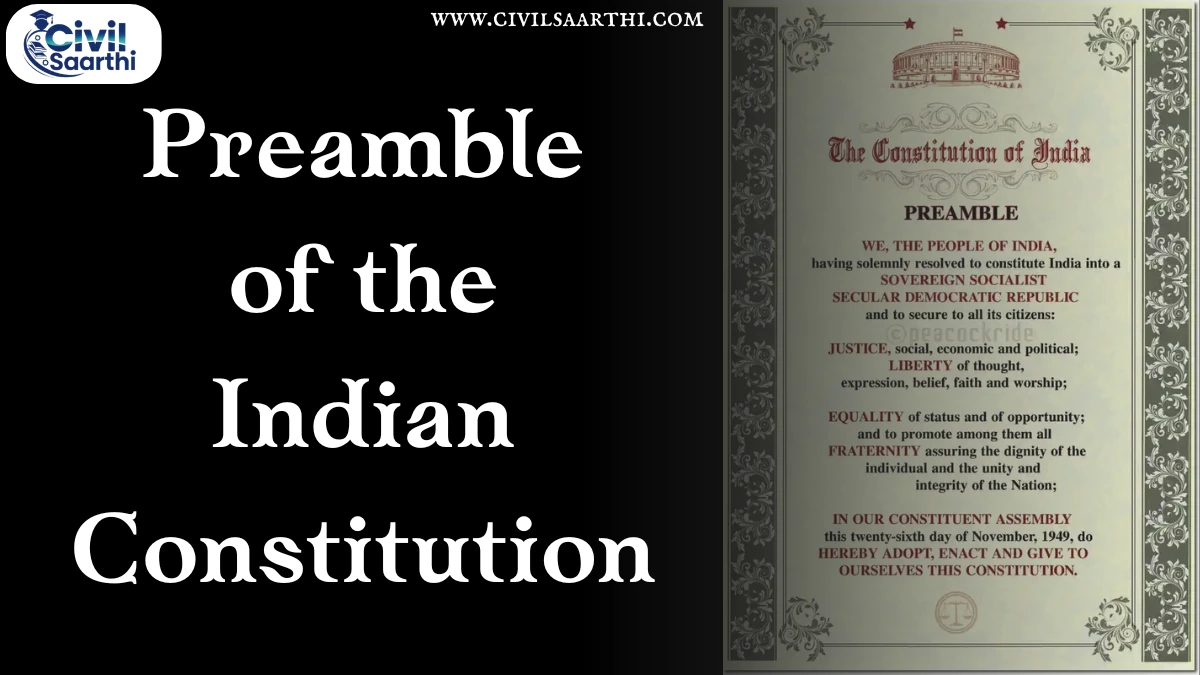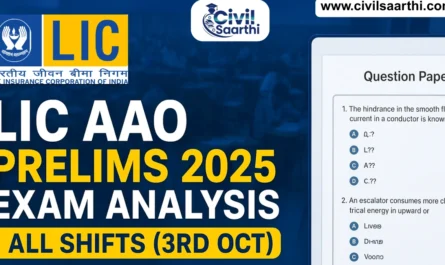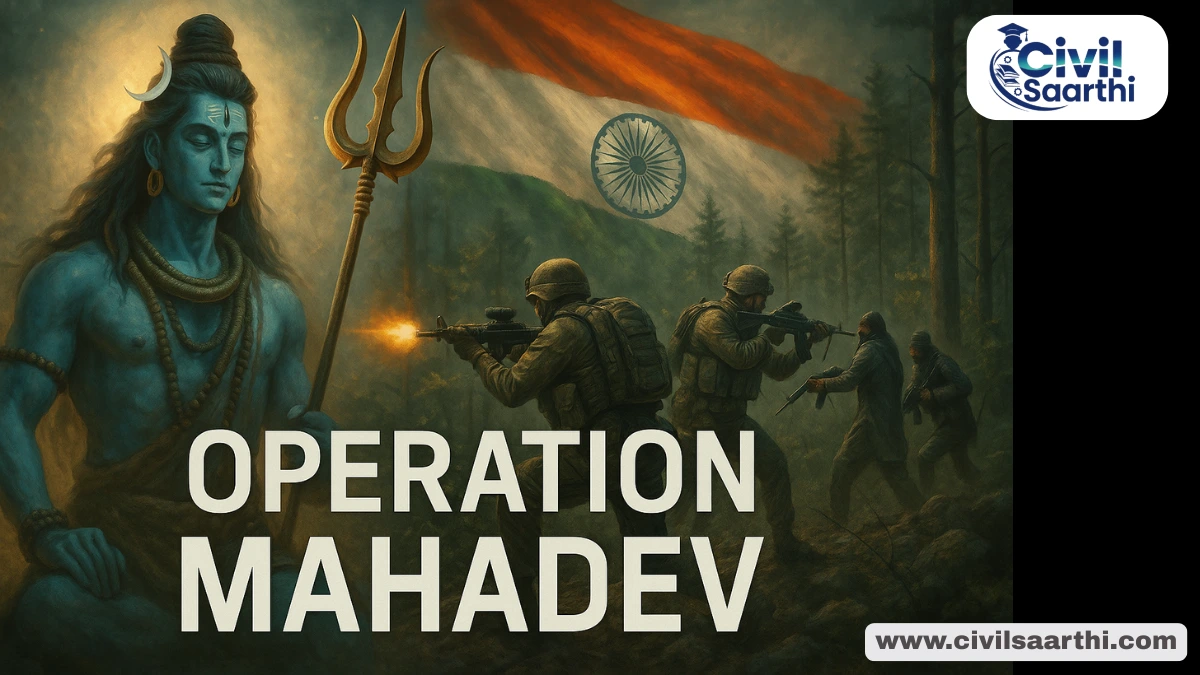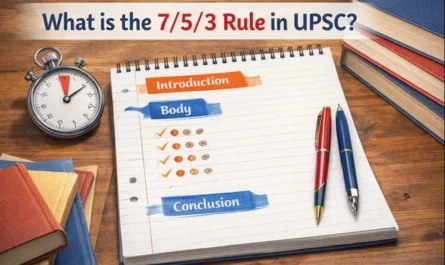The Preamble is the introductory statement of the Indian Constitution that clearly expresses the philosophical foundation, core values, and vision of the nation. It reflects the collective will and aspirations of the people of India and sets the tone for the entire Constitution. Acting as the soul of the Constitution, the Preamble defines the identity of the Indian state and the objectives it seeks to achieve, making it an essential element for understanding the constitutional framework.
Preamble Polity UPSC Notes
The Preamble, inspired by the Objectives Resolution of 1946, was formally adopted by the Constituent Assembly on 26th November 1949 and came into effect on 26th January 1950. It declares India to be a Sovereign, Socialist, Secular, Democratic Republic committed to securing Justice, Liberty, Equality, and Fraternity for all its citizens. While the Preamble is not enforceable by law, the Supreme Court has affirmed its position as an integral part of the Constitution that embodies its basic structure. The Preamble continues to guide the interpretation of constitutional provisions and the vision of governance in India.
Preamble Polity UPSC Notes: Overview
It acts as a guiding light for the interpretation of the Constitution and reflects the aspirations of the Indian people in establishing a just and inclusive society. Although the Preamble itself does not contain enforceable provisions, its role in shaping the constitutional ethos is fundamental.
Preamble Polity UPSC Notes: Overview | |
| Aspect | Details |
| Origin | Based on the Objectives Resolution, 1946 |
| Date of Adoption | 26th November 1949 |
| Came into Force | 26th January 1950 |
| Describes India As | Sovereign, Socialist, Secular, Democratic, Republic |
| Key Objectives | Justice, Liberty, Equality, Fraternity |
| Legal Status | Not enforceable, but part of Constitution (Kesavananda Bharati case, 1973) |
| Amendment | 42nd Constitutional Amendment, 1976 |
| Importance | Reflects ideals of Constitution, aids in interpretation, defines State goals |
Evolution of Preamble: Polity Notes
The Preamble of the Indian Constitution evolved from the historic Objectives Resolution moved by Jawaharlal Nehru on 13th December 1946 in the Constituent Assembly. It provided the ideological and philosophical framework for the Constitution. This resolution was adopted on 22nd January 1947.
- The US Constitution (for the concept of Preamble),
- The French Revolution (Liberty, Equality, Fraternity),
- The Government of India Act 1935 (administrative framework).
The Preamble was adopted along with the Constitution on 26th November 1949 and came into effect on 26th January 1950. The Preamble was finalized after the entire Constitution was framed. It is considered the soul and introduction of the Constitution.
Components of the Preamble – Preamble Polity Notes
The Preamble consists of four major components, each reflecting the foundational aspects of the Indian state and its governance structure:
1. Source of Authority
- “We, the people of India” declares that the Constitution derives power from the citizens of India, not from any external authority like the British Crown.
2. Nature of Indian State
Describes India as a:
- Sovereign – Free from external control.
- Socialist – Commitment to reduce inequality and promote welfare.
- Secular – Equal respect for all religions.
- Democratic – Government elected by people.
- Republic – Head of the state is elected, not hereditary.
3. Objectives of the Constitution
The Constitution aims to secure to all citizens:
- Justice (social, economic, political),
- Liberty (of thought, expression, belief, faith, and worship),
- Equality (of status and opportunity),
- Fraternity (assuring dignity and unity of the nation).
4. Date of Adoption
- The Constitution was adopted on 26th November 1949, which is celebrated as Constitution Day.
Ideals of the Indian State as Enshrined in the Preamble
The Preamble to the Constitution of India is the philosophical foundation of the Indian State. It sets out the objectives, ideals, and aspirations that the Constitution seeks to achieve. It represents the vision of the framers of the Constitution and serves as a guiding light for governance. The ideals outlined in the Preamble reflect the basic structure and constitutional morality of Indian polity.
Sovereign
The term Sovereign in the Preamble implies complete independence for India in both internal and external affairs.
- India is free to formulate its domestic policies without any external interference, and it has the autonomy to build its own foreign relations.
- Sovereignty ensures that India is not subject to any external authority, such as a foreign nation or supranational institution.
- In practical governance, this ideal reflects in India’s independent foreign policy, control over its military, and its right to make laws within its territory.
Socialist
The word Socialist was added to the Preamble by the 42nd Constitutional Amendment Act, 1976 during the Emergency. It emphasizes social and economic justice and aims to reduce inequalities of income, status, and opportunities.
Socialist ideals are reflected in various welfare schemes and inclusive policies, such as:
- MGNREGA (Mahatma Gandhi National Rural Employment Guarantee Act)
- Right to Education (RTE)
- Public Distribution System (PDS)
- National Food Security Act
These government initiatives work towards ensuring a classless society with equitable access to resources.
Secular
Secularism is one of the fundamental characteristics of the Indian State. It means that the State has no official religion and maintains an equal distance from all religions.
- Citizens are free to profess, practice, and propagate any religion of their choice, as guaranteed under Article 25 to 28 of the Indian Constitution.
- The Indian version of secularism is positive secularism, which allows for state intervention in religious matters to ensure equality and reform, such as banning untouchability and enforcing the Hindu Code Bills. The idea of secularism is vital to maintaining religious harmony in a pluralistic society like India.
Democratic
The word Democratic means that the government derives its authority from the will of the people.
- Democracy in India functions through universal adult franchise, where every citizen above 18 years has the right to vote.
- It ensures popular sovereignty, meaning the people are the true source of all political power.
The democratic nature of the Indian polity is upheld through:
- Regular, free, and fair elections
- Independent Election Commission
- Multi-party system
- Rule of law
- Freedom of expression and association
These features ensure political equality and allow people to participate in governance through elected representatives. Parliamentary democracy is a key feature of Indian politics.
Republic
The term Republic denotes that the head of state is elected, and not a hereditary monarch. In India, the President is elected indirectly by an electoral college.
- This ensures that the highest constitutional office is accessible to every citizen irrespective of birth, religion, or social background.
- The republican nature of the Indian State promotes equality before law, equal opportunity, and merit-based leadership.
- It guarantees that sovereign power lies with the people, not with a royal family or aristocracy.
Aspirations of the People – Preamble Polity Notes
The Preamble clearly outlines the aspirations and goals of the Indian people post-independence. These are meant to provide moral and legal direction to all organs of the state. These principles are essential for nation-building, social harmony, and the holistic development of Indian society.
Justice
- Social: Upliftment of marginalized groups (e.g., SC/ST reservations).
- Economic: Equal access to wealth and opportunities.
- Political: Free and fair political participation.
Liberty
- Of thought, expression, belief, faith, and worship.
- Ensured by Fundamental Rights (Articles 19–22).
Equality
- Of status and opportunity.
- Non-discrimination by the state (Article 15), equal access to public employment (Article 16).
Fraternity
- Promotes a sense of brotherhood among all citizens.
- Essential for national integration.
- Assures dignity of the individual and unity and integrity of the nation.
42nd Amendment – The Only Amendment to the Preamble
The 42nd Constitutional Amendment Act, 1976, made the only amendment to the Preamble of India. It was passed during the Emergency imposed by Prime Minister Indira Gandhi’s government. This amendment was made on the recommendation of the Sardar Swaran Singh Committee.
Three Words Added to the Preamble:
- Socialist
- Secular
- Integrity
These were added to reflect the emerging ideological commitments of the State at that time.
42nd Amendment – The Only Amendment to the Preamble | |
| Before 42nd Amendment (1950) | After 42nd Amendment (1976) |
| “Sovereign, Democratic Republic” | “Sovereign, Socialist, Secular, Democratic Republic” |
| “Unity of the Nation” | “Unity and Integrity of the Nation” |
Preamble as a Part of the Constitution: Supreme Court Judgements
The Preamble is now firmly established as a part of the Indian Constitution, primarily due to key Supreme Court judgments.
Initial View – Not Part
- In the Berubari Union Case (1960), SC said Preamble is not part of the Constitution and cannot be enforced in court.
Landmark Reversal – Kesavananda Bharati Case (1973)
- SC ruled that Preamble is part of the Constitution.
- It reflects the basic structure, which cannot be amended or violated.
LIC of India Case (1995)
- Reaffirmed Kesavananda.
- Preamble is an integral part, but not enforceable in a court of law.
Significance of the Preamble of Indian Constitution
The Preamble is often called the soul, identity, and philosophy of the Indian Constitution. It holds immense interpretative value and acts as a beacon for constitutional governance.
Key Significances:
- Reflects the ideals and aspirations of the people.
- Acts as an introduction and summary of the Constitution.
- Guides interpretation of ambiguous constitutional provisions.
- Upholds the basic structure doctrine.
- Inspires constitutional morality and ethical governance.
Previous Year UPSC Questions on Preamble
UPSC Prelims PYQs on Preamble
What was the exact constitutional status of India on 26th January, 1950? (2021)
- a) A democratic Republic
- b) A Sovereign Democratic Republic
- c) A Sovereign Secular Democratic Republic
- d) A Sovereign Socialist Secular Democratic Republic
Ans b
The Preamble to the Constitution of India, is: (2020)
- a) part of the Constitution but has no legal effect
- b) not a part of the Constitution and has no legal effect either
- c) a part of the Constitution and has the same legal effect as any other part
- d) a part of the Constitution but has no legal effect independently of other parts
Ans d
In the context of polity, which one of the following would you accept as the most appropriate definition of liberty? (2019)
- a) Protection against the tyranny of political rulers
- b) Absence of restraint
- c) Opportunity to do whatever one likes
- d) Opportunity to develop oneself fully
Ans d
Which one of the following reflects the most appropriate relationship between law and liberty? (2018)
- a) If there are more laws, there is less liberty.
- b) If there are no laws, there is no liberty.
- c) If there is liberty, laws have to be made by the people.
- d) If laws are changed too often, liberty is in danger.
Ans b
The mind of the makers of the Constitution of India is reflected in which of the following? (2017)
- a) The Preamble
- b) The Fundamental Rights
- c) The Directive Principles of State Policy
- d) The Fundamental Duties
Ans a
Which one of the following objectives is not embodied in the Preamble to the Constitution of India? (2017)
- a) Liberty of thought
- b) Economic liberty
- c) Liberty of expression
- d) Liberty of belief
Ans b
‘Economic Justice’ as one of the objectives of the Indian Constitutional has been provided in: (2013)
- a) the Preamble and the Fundamental Rights
- b) the Preamble and the Directive Principles of State Policy
- c) the Fundamental Rights and the Directive Rights and the Directive Principles of State Policy
- d) None of the above
Ans b
UPSC Mains GS Paper 2 PYQs on Preamble
Discuss each adjective attached to the word ‘Republic’ in the ‘Preamble’. Are they defendable in the present circumstances? (200 words, 12.5 marks) [2016]
Preamble of the Indian Constitution: Polity UPSC Notes FAQs
What is the significance of the Preamble?
The Preamble holds interpretative value and expresses the ideals, vision, and principles that guide the Indian Constitution.
Is the Preamble legally enforceable in a court of law?
No, the Preamble is not legally enforceable, but it plays a crucial role in judicial interpretation of constitutional provisions.
What does the term ‘Republic’ signify in the Preamble?
The term ‘Republic’ denotes that India has an elected head of state and guarantees that no public office is hereditary.
Which constitutional amendment added the words ‘Socialist’ and ‘Secular’ in the Preamble?
The 42nd Constitutional Amendment Act, 1976 inserted the words ‘Socialist’ and ‘Secular’ into the Preamble.
What is the origin of the Indian Preamble?
The Preamble is based on the Objectives Resolution moved by Jawaharlal Nehru in 1946 in the Constituent Assembly.
Is the Preamble considered a part of the Constitution?
Yes, the Supreme Court in the Kesavananda Bharati case (1973) held that the Preamble is a part of the Constitution.
Which core values are enshrined in the Preamble?
The Preamble enshrines the core values of Justice, Liberty, Equality, and Fraternity.







